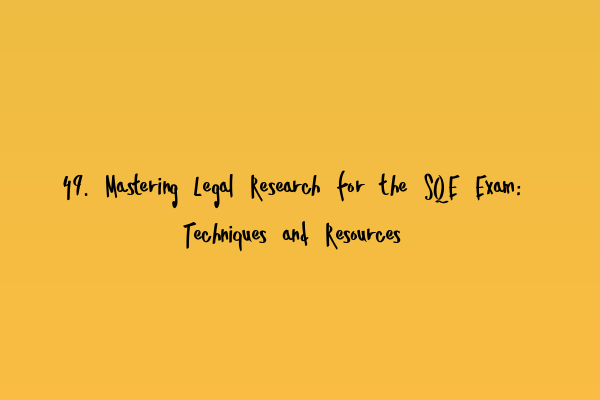Mastering Legal Research for the SQE Exam: Techniques and Resources
Legal research is a fundamental skill that every aspiring solicitor must master in order to excel in the SRA’s Solicitors Qualifying Examination (SQE) exam. The ability to conduct efficient and effective research is crucial in providing sound legal advice and building a strong legal argument.
In this article, we will explore the essential techniques and resources to help you master legal research for the SQE exam. By incorporating these strategies into your study routine, you can enhance your understanding of legal principles and improve your chances of success.
The Importance of Legal Research in the SQE Exam
The SQE exam assesses candidates on their practical legal skills, including their ability to conduct thorough legal research. In order to answer the exam questions accurately and confidently, it is essential to have a solid foundation in conducting research and finding relevant legal authorities.
Legal research is not just about locating relevant cases and statutes; it also involves critically analyzing and applying legal principles to specific scenarios. By honing your research skills, you can confidently navigate through complex legal issues and provide well-reasoned solutions.
Techniques for Effective Legal Research
1. Plan Your Research Strategy
Before diving into your research, it’s important to establish a clear plan. Define your research goals and identify the key legal concepts or issues you need to explore. This will help you stay focused and save time.
Break down your research into smaller, manageable tasks, and create a timeline to stay organized. This will ensure that you cover all relevant areas thoroughly and avoid missing any crucial information.
2. Understand the Question
To conduct effective research, it is crucial to fully comprehend the question or scenario presented in the exam. Take the time to read the question carefully, identify the legal issues involved, and highlight key keywords.
By clearly understanding the question, you can tailor your research to address the specific issues raised and avoid wasting time on irrelevant materials.
3. Utilize Primary and Secondary Sources
Legal research involves examining both primary and secondary sources of law. Primary sources include statutes, regulations, case law, and international treaties, while secondary sources encompass legal textbooks, journals, and commentaries.
Both types of sources are invaluable in gaining a comprehensive understanding of the law. Primary sources provide binding legal authority, while secondary sources offer critical analysis and commentary that can enhance your understanding and interpretation of the law.
Utilize online legal databases and libraries that provide access to a wide range of legal materials. These resources often feature advanced search functions that allow you to narrow down your search to specific jurisdictions or legal topics.
4. Use Advanced Search Techniques
Maximize your research efficiency by utilizing advanced search techniques in online legal databases. Use Boolean operators (e.g., AND, OR, NOT) to refine your search and combine different keywords.
Additionally, learn how to use filters and advanced search options to narrow down your results based on jurisdiction, date range, or specific legal authorities. This will help you find the most relevant and up-to-date information quickly.
5. Keep Track of Sources and Citations
As you conduct research, make sure to keep track of the sources and citations you come across. This will help you create a comprehensive bibliography and easily refer back to the relevant authorities during exam preparation.
Organizing your research materials will save you time and ensure you have a solid foundation to rely on when answering exam questions. Consider using citation management tools to streamline the process and maintain tidy research notes.
6. Practice, Practice, Practice
The key to mastering legal research is practice. Familiarize yourself with a variety of legal research questions and practice answering them under timed conditions. This will help you build your speed and accuracy in locating and analyzing legal authorities.
Take advantage of practice exam questions and mocks specifically designed for the SQE exam. These resources will not only test your knowledge and skills but also provide feedback to help you identify areas for improvement.
Resources for Legal Research
When it comes to legal research, having access to the right resources is crucial. Here are some recommended resources to aid in your SQE exam preparation:
1. SQE 1 Practice Exam Questions: These practice questions will help you familiarize yourself with the format and types of questions you may encounter in the SQE 1 exam.
2. SQE 1 Practice Mocks FLK1 FLK2: These mock exams simulate the real exam conditions and provide valuable feedback to help you assess your strengths and weaknesses.
3. SQE 2 Preparation Courses: These courses are designed to help you prepare for the SQE 2 exam, which includes legal research and writing. They provide comprehensive guidance on legal research techniques and strategies.
4. SQE 1 Preparation Courses: These courses offer comprehensive preparation for the SQE 1 exam. They cover various topics, including legal research, to ensure you have a strong foundation in all areas assessed in the exam.
5. SRA SQE Exam Dates: Stay updated on the upcoming SQE exam dates to plan your study schedule effectively. Knowing the exam dates will help you allocate sufficient time for each exam component, including legal research.
Conclusion
Mastering legal research is an essential skill for success in the SQE exam and future legal practice. By implementing effective research techniques and utilizing the recommended resources, you can enhance your ability to locate, analyze, and apply relevant legal authorities.
Remember to plan your research strategy, understand the question, utilize primary and secondary sources, and practice under timed conditions. By incorporating these strategies into your study routine, you can strengthen your legal research skills and increase your chances of excelling in the SQE exam.
